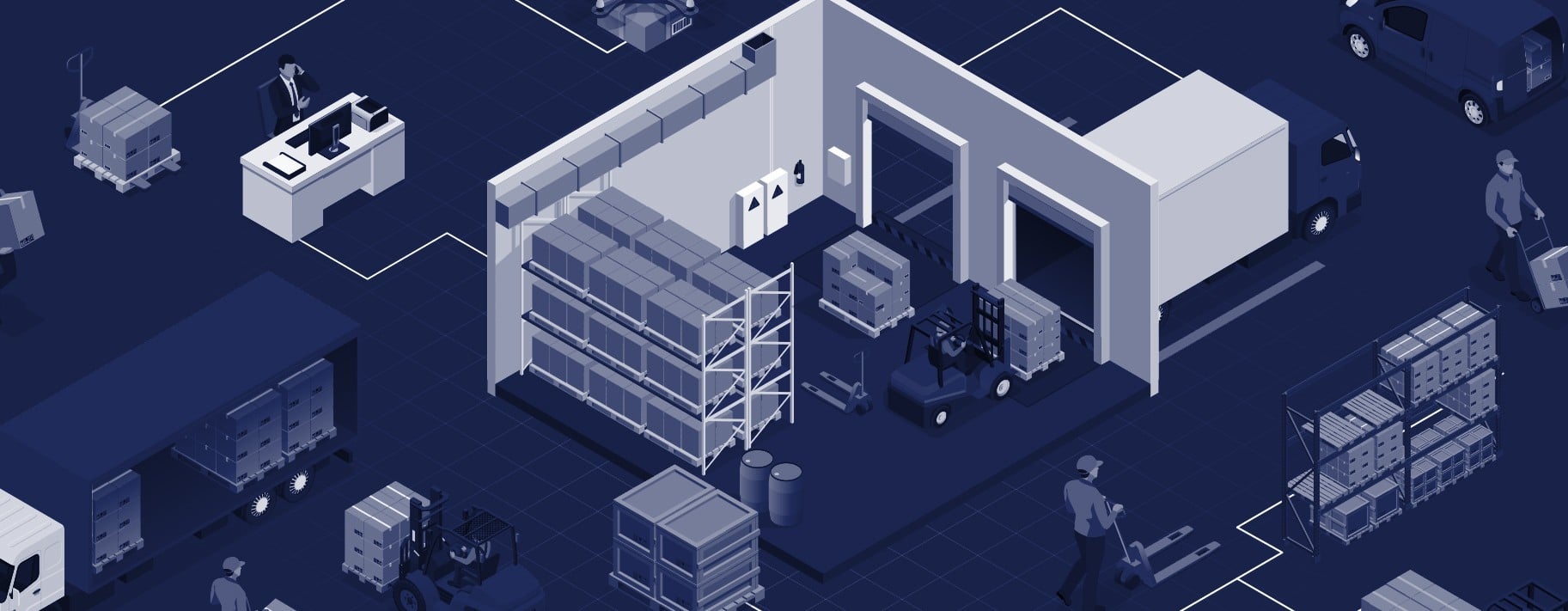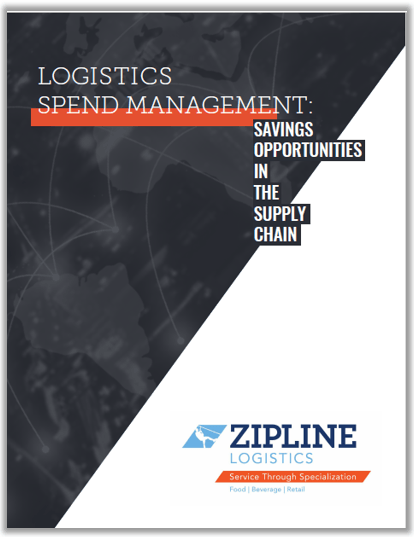
Before you decide to work with a third-party logistics (3PL) provider, it helps to understand how the relationship will look and function for brokering freight. What exactly will a freight transportation broker take off your plate, and what responsibilities will still be in your court?
Here’s a breakdown of how a logistics broker works, along with key points surrounding their value-added services and tips for how you can help them, help you.
What Does a Freight Broker Do?
Order Tender
To start, a business (shipper) calls or emails an order to a freight broker (3PL) for pickup. It is imperative that a 3PL collects all necessary information when tendering freight, no matter if it is a regularly scheduled shipment, or a special order or event. In addition to basic location and contact information, they need to know special packing or handling instructions, compliance standards, equipment, and consignee preferences.
If set up with Electronic Data Integration (EDI) or an Application Programming Interface (APIs), a shipper can provide all necessary information to their 3PL without email or phone, and instead have data automatically processed and sent over to their transportation partner.
If you’re interested in learning about what’s involved with becoming a logistics broker, you can take a look at this in-depth freight broker startup guide.
“Logisticizing”
Most CPG shippers skip this step in the life of a load altogether — which can be a costly oversight.
What many don’t know is that retailers set high expectations for your brand’s delivery performance to combat stockouts. Not meeting those requirements often results in huge fees, damaged retail relationships, and missed sales from not being on the shelf.
Shippers can avoid this and dominate the shelf by creating an intentional logistics strategy based off of historical data, consolidation opportunities, and smashing on-time in-full (OTIF) delivery out of the park.
Freight Scheduling
A 3PL then takes all the above information, enters the order into their freight management system, and works to schedule and confirm exact order pick-up and delivery times.
This is where a 3PL provider can offer tremendous value. They take the time to secure qualified transportation by selling and then booking, a skilled carrier on the order. A freight broker builds their network full of carriers they’ve vetted and can depend on. Rather than testing drivers on your own, you can rely on a truck broker’s experience and robust database to find the best option.
This is also when important handling information is shared. Before booking, it must be confirmed that the carrier (truck driver) has:
- Appropriate equipment that is clean and up-to-date
- A current, valid license
- The required amounts of cargo and liability insurance coverage
- Ability to handle any special needs (i.e. driver assist, team transit, etc.)
- A trailer that won’t be carrying any potential contaminants
- Committed to the mandatory timeline, with required drivable hours available
Dispatch
When the time comes for a scheduled order to be picked up, the 3PL personally connects with the driver, doublechecking all his/her important information (name, trailer type, truck #, trailer #, cell phone, and his current empty location), and recommunicates handling requirements. This is also when drivers are given pick-up information.
Loading
Your 3PL stays in contact with the carrier during the entire process of loading. This is not considered complete until all freight has been put on the trailer, the trailer has been shut, in some cases sealed, and the carrier has signed the shipper’s Bill of Lading (BOL), accepting possession and liability of the freight.
When speaking to the driver at this point, 3PL representatives should verify the skid and case count, as well as the destination shown on the bill, to make sure the carrier has been loaded with correct freight. This is an important step. Having to backtrack and try to resolve instances of wrongfully loaded product can derail tight timelines and cause unnecessary stress.
Transit
Your 3PL provider will stay in contact with the driver throughout transit of the load. Using GPS tracking technologies such as Macro Point, they can maintain the location of the shipment to delivery. Regular check-in calls with the carrier also help to ensure everything is on track and appointment times will be met. Your 3PL will often provide the carrier with driving directions, or act as a liaison to communicate any hurdles along the way, such as traffic or weather delays.
Unloading
Once a driver has arrived at their destination, he or she must document the arrival time in case there is a problem with detention – if the carrier waits beyond a certain time limit, they can be charged.
Delivery
Once the driver is fully unloaded, the consignee signs the Bill of Lading, noting any overage, shortages, or damages (OS&D), thus accepting possession of the delivering product. The consignee will document on the bill what time the unload was completed.
The 3PL now awaits the paperwork to be turned in by the carrier (Invoice, Proof Of Delivery (POD) etc.) so the shipper can be invoiced and the carrier’s payment cycle can begin.
Billing
Once a 3PL receives the carrier’s invoice, along with all necessary paperwork for the shipper, they are considered ready to bill and an invoice is generated.
Important transportation paperwork includes:
- Lumper Receipts
- Driver Work Receipts
- POD/BOL
- Rate Confirmation
Why Outsource to a Freight Broker? Why Companies Use a Logistics Broker
A 3PL partner can take many tasks off your plate, the most obvious being the booking of a truck for pick-up and delivery. But the value of a 3PL goes far beyond freeing up your time. Here are additional benefits and reasons why companies use third-party logistics providers:
Expertise
A specialized 3PL can help provide information about your consignees and their preferences. For example, you may be delivering into a new location, and experience knowledge gaps. An experienced service provider will be able to share imperative compliance and scheduling details with you, improving your relationship and performance with buyers.
Constant Communication
A service-focused 3PL tracks and logs updates each step of the way. They are in regular communication with drivers and have GPS technologies in place to maintain status of an order. They can also send you real-time updates and alerts via email or phone about order status, delivering peace of mind.
Issue Management
Things happen on the road that can delay an order, no matter how much prep and communication goes on with a driver. A 3PL partner can handle these concerns, either rebooking another truck, aiding a driver with their unplanned event, or communicating updates to receivers. Issues of the road could include:
- Breakdowns
- Accidents
- Weather interruptions
- Schedule changes
- Health concerns
- Unplanned check points
This also includes claim management. A 3PL partner can help you file and push necessary information through the legal system quickly, removing responsibilities from the plate of the shipper, saving time and money.
Qualified Network
Vetting the equipment, insurance, and qualifications of carriers is a large undertaking. Before you hand your product over to a driver, you need to ensure they are the right person or company to represent your organization. A 3PL works tirelessly to build their carrier network to include only qualified and reliable service providers.
Technology
A 3PL can take on the responsibility and costs associated with investing in technologies that improve your operations. Valuable technologies often offered by 3PLs:
- Transportation Management Systems (TMS)
- GPS Tracking
- Reporting Software
- Electronic Data Integration (EDI) Software
- Application Programming Interfaces (APIs)
- Optimization Calculators
- Data Analysis Tools
- Quick Pay/E-Pay
Built in-house and improved daily by the Zipline Logistics Development Team, KANOPI is our proprietary shipper intelligence tool. Our retail logistics experts leverage KANOPI to optimize client supply chain efficiency, reduce costs, and skyrocket logistics performance.
Our technology suite offers shippers with revenue between $1 Million and $1 Billion the visibility and insight “Big Box” 3PLs reserve for Fortune 100 customers.
KANOPI helps Zipline clients achieve up to:
- $1.2 Million in transportation savings
- 20% reduction in cost per pallet through consolidation
- 17% improvement in meeting on-time in-full delivery (OTIF)
- 30% increase in network efficiency
- 861,908 fewer projected miles traveled overall
KANOPI Consolidation Service Features and Benefits:
- Real-time identification of consolidation opportunities based on routing, due dates, and LTL rate comparisons.
- Only your orders will share the same dedicated truck, meaning your shipments will not be mixed in with other clients’ orders.
- Zipline teams frequently perform strategic analyses of historical orders to identify and capture future consolidation opportunities.
- Maximizes value for brands needing to meet strict appointment due dates.
- Displays a real-time, running total of consolidation cost savings over time so you can keep track and celebrate wins.
- Can identify and help streamline warehouse and inventory inefficiencies.
Scalability
You can more easily manage high and low seasons with the assistance of a 3PL and they can help you quickly respond to increases in demand or expansion. 3PLs are connected to service providers nationwide and can more easily respond to flux, linking you to resources without any added risk or legwork.
How Shippers Can Get the Most Out of a Freight Broker or Logistics Brokers
The shipper can make a 3PL relationship most beneficial by doing the following:
Communicate KPIs or Benchmarks with Your 3PL
Your 3PL partner should provide more value than just transport of product. Keeping them abreast of your company’s larger goals and performance and costs benchmarks will enable them to help you reach those milestones.
Provide as Much Detail as Possible
It’s hard to overcommunicate when it comes to freight management. The more details a 3PL or carrier has about an order, the better service they can provide.
Provide Advanced Notice
The more time a 3PL has to book an order, the better pricing and service they can secure. This extra time enables carriers to plan ahead. If they know when and where their truck will be, they can begin looking for backhauls well in advance. This lowers the need for them to charge a higher rate since they can leave a location with another profitable truckload. Advanced notice also helps your 3PL lock in appointment times and book the best possible carrier partner. Helping carriers avoid the hassle of scrambling to find day-of opportunities, shows respect and builds better partnerships.
When you’re concentrated on growing your business and don’t have time to monitor your transportation step by step — that’s when a 3PL partner can help. They will provide you with security and visibility throughout the life of your load, invest in technology on your behalf, act as expert supply chain consultants, and help you deliver on customer demands.
—
 | Logistics Spend Management: Savings Opportunities in the Supply Chain Looking to reduce your transportation spend? Check out our eBook for advice on how to identify untapped logistics savings opportunities. |